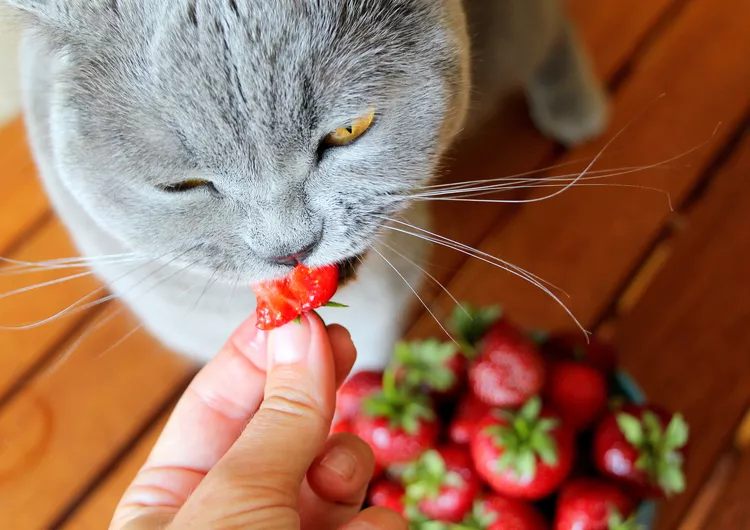Can Cats Eat Strawberries? How to Safely Share This Summer Berry

If you and your cat share a bit of a sweet tooth, you may be wondering—can cats eat strawberries? Yes, cats can safely eat strawberries, but that doesn’t mean they should get free access to a bowl of the fruit. Here are all the risks and potential benefits of strawberries for cats and how to safely share this fruit with your cat.
Are Strawberries Safe for Cats?
Strawberries are considered safe and non-toxic to cats. Because strawberries have a high sugar content, they are not a good treat option for your cat to eat regularly. However, an occasional strawberry is an okay treat for most healthy cats.
Nutritional Value of Strawberries for Cats
Strawberries don’t offer much to cats in the way of significant nutritional value. Strawberries are quite high in sugars, while your cat is an obligate carnivore who thrives on high-protein meals that contain meats. Strawberries do contain Vitamin C, folate, manganese, and potassium. The fruit is also considered a good source of antioxidants.
While the vitamins and minerals in strawberries are healthy for cats to consume, your cat should be having their daily nutritional requirements met by their complete and balanced commercial diet. They should not require an extra supplemental source to meet their needs.
Potential Benefits and Risks of Strawberries for Cats
Keeping in mind that strawberries aren’t particularly beneficial to your cat’s nutrition, most of the benefits of strawberries for your cat relate to your cat's mental stimulation. Trying safe novel foods can be a fun form of enrichment for your cat. If your cat ends up being a fan of strawberries, a small amount of strawberry can occasionally serve as a high-value reward when your cat performs a desirable behavior, such as performing a training trick you've been working on.
The risks of feeding strawberries to your cat include:
- Nutritional imbalance: Treats, including strawberries, should not make up more than 10% of your cat’s total caloric intake. If you feed excessive amounts of treats, you may impact your pet’s nutritional balance
- Gastrointestinal upset: Strawberries and other fruits don’t always sit well with cats, particularly if they're not used to eating them. Nausea, vomiting, and diarrhea could occur.
- Exacerbation of underlying health conditions: Strawberries may not be a safe option for all cats, such as cats with diabetes, because of their high sugar content. If your cat has a health condition, get your veterinarian’s approval before feeding strawberries.
- Choking: You can reduce the risk of choking by cutting strawberries into smaller pieces that are easily swallowed. Choking is a risk with all fruits.
- Allergic reaction. Though rare, cats can develop allergies to strawberries with repeated exposure to the fruit. Severe allergic reactions can be life-threatening without emergency treatment.
Signs of Allergic Reactions or Digestive Issues
It’s not uncommon for cats to be intolerant of strawberries or other fruits that aren’t a regular part of their diet. Signs of digestive issues could include:
- Vomiting
- Diarrhea
- Decreased appetite
- Excessive salivation due to nausea
- Gassiness
Strawberry allergies are not common in cats, but signs of an allergy to watch for include:
- Hives
- Facial or limb swelling
- Intense itchiness
- Red or inflamed skin
- Vomiting
- Difficulty breathing
- Collapse
After introducing strawberries to your cat, make sure to monitor them closely for negative reactions to the fruit. If your cat develops mild gastrointestinal upset, you can usually safely monitor at home. In the unlikely event of an allergic reaction, seek emergency veterinary attention.
Other Safe Treats for Cats
Although an occasional strawberry is a safe treat for most healthy cats, there are plenty of safe treats to choose from for your feline family member, including other fruits and commercial cat treats. Always feed treats in moderation and speak with your veterinarian before offering any human foods to your cat, especially if your cat has a food allergy, diabetes, or other chronic health condition.
- Bananas
- Watermelon
- Blueberries
- Apples
- Cranberries
- Blackberries
- Commercial cat treats
- Lickable treats